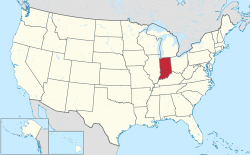United States presidential elections in Indiana
 | |
| No. of elections | 51 |
|---|---|
| Voted Democrat | 14 |
| Voted Republican | 33 |
| Voted Whig | 2 |
| Voted Democratic-Republican | 2 |
| Voted other | 0 |
| Voted for winning candidate | 39 |
| Voted for losing candidate | 12 |
Following is a table of United States presidential elections in Indiana, ordered by year. Since its admission to statehood in 1816, Indiana has participated in every U.S. presidential election.
Winners of the state are in bold.
Elections from 1864 to present
Election of 1860
The election of 1860 was a complex realigning election in which the breakdown of the previous two-party alignment culminated in four parties each competing for influence in different parts of the country. The result of the election, with the victory of an ardent opponent of slavery, spurred the secession of eleven states and brought about the American Civil War.
| Year | Winner (nationally) | Votes | Percent | Loser (nationally) | Votes | Percent | Loser (nationally) | Votes | Percent | Loser (nationally) | Votes | Percent | Electoral Votes |
|---|---|---|---|---|---|---|---|---|---|---|---|---|---|
| 1860 | Abraham Lincoln | 139,033 | 51.1 | Stephen A. Douglas | 115,509 | 42.4 | John C. Breckinridge | 12,295 | 4.5 | John Bell | 5,306 | 1.9 | 13 |
Elections from 1828 to 1856
| Year | Winner (nationally) | Votes | Percent | Loser (nationally) | Votes | Percent | Other national candidates[lower-alpha 1] |
Votes | Percent | Electoral Votes |
Notes |
|---|---|---|---|---|---|---|---|---|---|---|---|
| 1856 | James Buchanan | 118,670 | 50.41 | John C. Frémont | 94,375 | 40.09 | Millard Fillmore | 22,386 | 9.51 | 13 | |
| 1852 | Franklin Pierce | 95,340 | 52.05 | Winfield Scott | 80,901 | 44.17 | John P. Hale | 6,929 | 3.78 | 13 | |
| 1848 | Zachary Taylor | 69,907 | 45.77 | Lewis Cass | 74,745 | 48.93 | Martin Van Buren | 8,100 | 5.3 | 12 | |
| 1844 | James K. Polk | 70,181 | 50.07 | Henry Clay | 67,867 | 48.42 | - | 12 | |||
| 1840 | William Henry Harrison | 65,302 | 55.86 | Martin Van Buren | 51,604 | 44.14 | - | 9 | |||
| 1836 | Martin Van Buren | 32,478 | 44.03 | William Henry Harrison | 41,281 | 55.97 | various[lower-alpha 3] | 9 | |||
| 1832 | Andrew Jackson | 31,551 | 67.1 | Henry Clay | 15,472 | 32.9 | William Wirt | no ballots | 9 | ||
| 1828 | Andrew Jackson | 22,201 | 56.62 | John Quincy Adams | 17,009 | 43.38 | - | 5 |
Election of 1824
The election of 1824 was a complex realigning election following the collapse of the prevailing Democratic-Republican Party, resulting in four different candidates each claiming to carry the banner of the party, and competing for influence in different parts of the country. The election was the only one in history to be decided by the House of Representatives under the provisions of the Twelfth Amendment to the United States Constitution after no candidate secured a majority of the electoral vote. It was also the only presidential election in which the candidate who received a plurality of electoral votes (Andrew Jackson) did not become President, a source of great bitterness for Jackson and his supporters, who proclaimed the election of Adams a corrupt bargain.
| Year | Winner (nationally) | Votes | Percent | Loser (nationally) | Votes | Percent | Loser (nationally) | Votes | Percent | Loser (nationally) | Votes | Percent | Electoral Votes |
|---|---|---|---|---|---|---|---|---|---|---|---|---|---|
| 1824 | Andrew Jackson | 7,343 | 46.61 | John Quincy Adams | 3,095 | 19.65 | Henry Clay | 5,315 | 33.74 | William H. Crawford | no ballots | - | 5 |
Elections of 1816 and 1820
In the election of 1820, incumbent President James Monroe ran effectively unopposed, winning all three of Indiana’s electoral votes, and all electoral votes nationwide except one vote in New Hampshire. To the extent that a popular vote was held, it was primarily directed to filling the office of Vice President.
The election of 1816 was contested between James Monroe and Rufus King. In this election, Indiana did not conduct a popular vote. Each Elector was appointed by state legislature, which assigned all three of Indiana’s electoral votes to Monroe.
Notes
- 1 2 For purposes of these lists, other national candidates are defined as those who won at least one electoral vote, or won at least ten percent of the vote in multiple states.
- ↑ Was allied with a slate of unpledged electors in Louisiana, Mississippi and South Carolina
- ↑ Three other candidates ran and received electoral votes nationally as part of the unsuccessful Whig strategy to defeat Martin Van Buren by running four candidates with local appeal in different regions of the country. The others were Hugh Lawson White, Daniel Webster, and Willie Person Mangum. None of these candidates appeared on the ballot in Indiana.